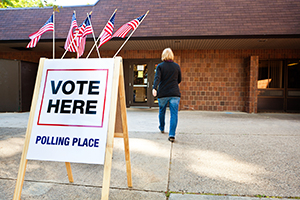Tips for Facing Election Season Stress

The current presidential election has been arguably one of the most hotly contested since the election of 1800, which is currently being dramatized in the popular hip-hop Broadway musical Hamilton. The tensions of the 1800 election set in motion animosity between Alexander Hamilton and Vice President Aaron Burr that ultimately resulted in Mr. Hamilton, the first secretary of the U.S. Treasury, being killed by Mr. Burr in a duel in 1804. Political and personal tensions were clearly high at the beginning of our nation.
Regardless of whom you are rooting for in the national and local elections, the stress and tension of this election season are clearly upon our nation. A recent Harris Poll conducted on behalf of the American Psychological Association (APA) found 52 percent of Americans report the 2016 election is a significant source of stress for them.
“We’re seeing that it doesn’t matter whether you’re registered as a Democrat or Republican—U.S. adults say they are experiencing significant stress from the current election,” says Lynn Bufka, PhD, APA’s associate executive director for practice research and policy. “Election stress becomes exacerbated by arguments, stories, images, and video on social media that can heighten concern and frustration, particularly with thousands of comments that can range from factual to hostile or even inflammatory.”
For people affected by ADHD, including the many people who also have co-occurring anxiety, this stress not only affects the adults in the family, but can also trickle down to the children in the family. Stress displayed by parents can affect their children’s behavior and cause them to act out at school for no apparent reason. Recognizing that your stress and frustration can have an impact on your child’s mood and helping your child to cope with anxiety is important for her overall well-being. Even if you don’t think you’re stressed, the constant barrage of election news and talk at school can trouble your child.
The following suggestions may help you manage and cope with election season stress:
- Try to avoid the news and limit your social media consumption. The 24-hour news cycle can give you emotional overload and cause you stress. Consider taking a media break or turning off your newsfeed.
- Do things that promote calmness and lessen stress. Engage in those activities that bring you and your family joy: cook a meal with loved ones, watch a comedy or fun child’s movie, or go for a walk together. Read a book, exercise, and meditate.
- Avoid talking about the election. If you have opposite opinions with loved ones or family members, talk about things you have in common. If your children are in earshot, try to avoid talking about volatile election subjects.
- Continue to talk with your child about happy and relaxing things. Focus on ways you can improve life in your community through participating in community activities. Put your energies into community service. Volunteer work can make a positive difference. Better yet, consider doing service together as a family or with a friend to promote positive change.
How else can you be proactive in managing the stress of the election, according to the APA? Make sure to vote to make your voice heard.
“In our democracy, a citizen’s voice does matter,” the APA states, “By voting, you will be taking a proactive step and participating in our system of government. Find balanced information to learn about all the candidates and local issues on your ballot, make informed decisions and wear your ‘I voted’ sticker with pride.”
As the election itself nears, continue to talk with your child about happy and relaxing things. Meditation and mindfulness can also help. The Washington Post has highlighted an app specifically designed to provide emergency election stress meditations.
Tell us what you think. Comment now.
